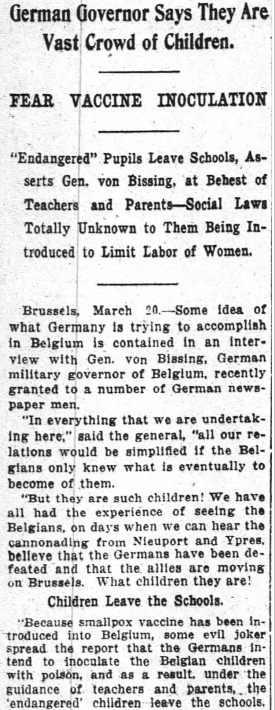15 May Ancestry search- Newsletter- May 15, 2021
Contents
- 1
- 2 How long before your kids start talking about DNA?
- 3 Vaccines a gift or curse- the arguments come around every time. During the World Wars, you had the British citizens fearing the risk of bringing in unvaccinated refugees (below) and Belgian citizens fearing the German-provided vaccines were poison (right).
- 4 Drop the masks!
- 5 If you liked Storyworth, check out Saga!
- 6 Still don’t know what to get dad for Father’s Day?
How long before your kids start talking about DNA?
They think it stands for “Dan Nelson’s Ancestry,” but here is a resource if you want to set them straight:
https://owlcation.com/academia/explaining-dna-to-a-six-year-old
 Vaccines a gift or curse- the arguments come around every time. During the World Wars, you had the British citizens fearing the risk of bringing in unvaccinated refugees (below) and Belgian citizens fearing the German-provided vaccines were poison (right).
Vaccines a gift or curse- the arguments come around every time. During the World Wars, you had the British citizens fearing the risk of bringing in unvaccinated refugees (below) and Belgian citizens fearing the German-provided vaccines were poison (right).
It seems that medical fitness was of concern to the authorities dealing with the arrivals from Belgium, not just those refugees who had been wounded in the fighting. At an early volunteer meeting for this project, we looked at refugee center registration forms which inquired of the refugees, ‘If vaccinated, when?’
In 1910 the only vaccine was for smallpox. Although in 1914, Belgian bacteriologist Octave Gengou had just developed the first Pertussis (whooping cough) vaccine, the next vaccines came slowly – Diphtheria in 1926, Tetanus (1938), DTP combined vaccine (1948), and Measles (1968). The smallpox vaccine was developed during the 18th century. Lady Mary Wortley Montague inoculated her son in 1718 on a trip to the Ottoman Empire. The process involved using live smallpox virus in the pus taken from a smallpox blister in a mild case of the disease and introducing it into the scratched skin of a previously uninfected person to promote immunity to the disease. The safer technique developed by Edward Jenner in 1796 of vaccination from cowpox gained favor. Should anyone wonder why these people were so keen to develop this protection? A few facts: an estimated 400,000 Europeans were killed by the disease annually during the closing years of the 18th century, and it was responsible for a third of all blindness. Moreover, 20-60 percent of those infected, and over 80 percent of infected children, died of the disease.
Finding out that the British government introduced compulsory smallpox vaccination by an Act of Parliament in 1853, and parents were fined if they didn’t have their babies vaccinated lead me to wonder about Victorian, or rather pre-1914, health care. The 19th century saw many improvements to medicine and health. However, patients were expected to pay for their own treatment. Some free hospitals were available, and friendly societies offered health insurance schemes.
Previously, in the 1840s, the government had offered free and voluntary vaccinations targeted at the poor. This effort failed when people, wary of the effects of the vaccination, refused it. Thus, the Compulsory Vaccination Act was passed, and with it was born a strong anti-vaccination movement. Several changes in the law lead to it becoming no longer compulsory in 1907.
 Drop the masks!
Drop the masks!
I know many of us were excited with yesterday’s news that those who have been vaccinated no longer have to wear masks. Back in 1922, this governor forbid the wearing of masks in public. Masks have meant many things at different times in history. They represented fun like mask balls and Halloween; safety like gas masks and wearing them to prevent the spread of disease; fictional good guys like the Lone Ranger, and Batman protecting their identity; and lastly masks that created fear, as cowards hid behind them to terrorize others, such as the Ku Klux Klan. It was nice to find this article showing masks were banned to diminish the power of the KKK.
 If you liked Storyworth, check out Saga!
If you liked Storyworth, check out Saga!
“I started Saga for my own mom and dad. The stories they told my little sister and me when we were growing up are a huge part of who I am, and I’d wanted to record their stories for years. Sharing our memories from afar has brought our family, laughter and nostalgia, sparked new conversations and brought us closer together. It is my dearest wish that your family will find the same”.
https://www.cnet.com/news/turn-grandmas-memories-into-a-podcast-with-the-saga-app/
 Still don’t know what to get dad for Father’s Day?
Still don’t know what to get dad for Father’s Day?
One of my kids gave me StoryWorth as a gift, and I have become a fan. My clients are supportive of capturing their family legacy but struggle to gather their own story. Here is an inexpensive way to help them capture and preserve excerpts to their story. If you look, there is a Father’s Day coupon out on the internet. If you sign up, please enter DancestorsGenealogy as who referred you!
https://welcome.storyworth.com/?






